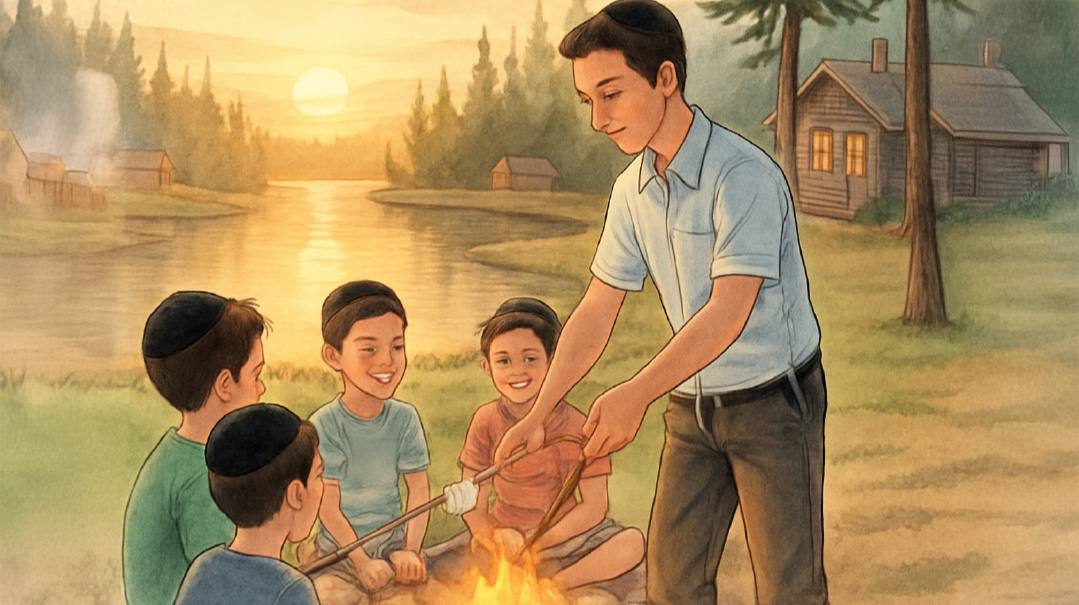In Appreciation of Camp Counselors
| June 24, 2025When a counselor makes the decision to spend a summer giving to others, its effect on him lasts forever

T
he famous song “My Zaidy” by the great Moshe Yess a"h challenges the listener to ponder his powerful question: “Who will be the zaidies of our children?” The question is primarily directed at the world of kiruv. I am not much involved in kiruv, but as a camp director, the phrase, slightly adapted, rings very relevant.
For two months a year, with Hashem’s help, camp has the amazing opportunity to create an impression on boys that lasts a lifetime. But to paraphrase Moshe Yess, my question is: Who will be the counselors of our children?
Let’s explain the question.
Camp counselors work hard. Very hard. Especially coming from a zeman and a world where they have little to be concerned with other than their own personal needs. When a counselor makes the decision to spend a summer giving to others, its effect on him lasts forever.
Bochurim who decide that they’re going to be counselors during their bein hazmanim are to be applauded and should know they are doing themselves and their future families a tremendous service.
When this young man, who has been worried only about yiush shelo midaas for an entire zeman (pause here to appreciate the thousands of shteiging and soaring bochurim), wakes up at 3 a.m. to bring a sick camper to the infirmary, he’s become that much more prepared for parenthood and for life.
When supper is served after a long day of activities, and he makes sure all 15 hungry camper-mouths are fed before he himself sits down to eat, he’s equipping himself with real-life tools and middos that will serve him very well. I can recall so many times over the years, after observing a fabulous counselor, turning to a fellow administrator and saying, “He’s going to make an awesome husband.”
Over the years, I’ve watched many hardworking staff members who chose to shift their focus to the needs of others for a few weeks, and then marched into Elul taller and prouder, having learned great life skills they’ll use forever. Guaranteed.
Yes, there are many summer mesivta program options for bochurim, and there is likely a need for them. I myself offer one; math dictates that there simply will not be enough staff jobs in camp for the many bochurim during bein hazmanim.
But let’s be honest, when our bochurim hit the age when they can be staff members, and yet we offer them a program very similar to that offered to elementary-aged boys, we’ve robbed them of a golden opportunity to mature and grow.
Yes, the bochurim need to unwind from the long zeman they’ve just finished, and to rejuvenate for the next one (beginning sooner than they’d like to think). But interestingly, there is plenty of energy and vitalization that comes from hard work and a feeling of fulfillment. Most of the programs out there, great as they are, don’t compare to the value and gain of shouldering the achrayus of taking care of a bunk for a few weeks.
The Gemara tells us in Eiruvin that there are three ways a person can be defined: “b’koso, b’kiso, ub’kaaso” — how he acts when he drinks, with his money, and when he’s angry. I half-jokingly tell our staff in camp that if I could add one to the list, I would add “b’campo.” In camp, staff members have a lot thrown their way, and the way they respond to and grow from those experiences speaks volumes about them.
Of course, if your son has chosen to be a counselor, you are probably already very happy and proud that he will be working hard and making a few (okay, very few) bucks so he can put some extra cash in his pocket, or at least not burden you with the cost of a silly, questionable, reckless road trip.
But most of all, you should know that he has taken advantage of one of the best pre-marriage opportunities. He has to worry about more than just himself. He has decided to forgo some of the excessive and extravagant programs available to him (and which send a questionable message to bochurim about what we value) and he chose connection and commitment.
So if you’re the parents of a counselor who stayed up until the early hours of the morning just to make sure a camper returning from a family simchah got safely to his bunk, and then got up early to learn before Shacharis and waking up his bunk, you should be very proud. Maybe even mention it to the shadchan. (Yes, I did witness this, and no, he’s not dating yet.)
If you’re the mother of a girl who is “in the parshah” and the boy she’s redt to was a counselor in camp, you’ll be happy to know he’s already had some practice at the night shift, he can handle suppertime just fine, he knows how to be a positive role model, and he’ll probably be amazing at keeping the kids happy on a hectic Chol Hamoed trip.
So to answer our question, who will be the counselors of our children?
Turns out, it’s the same ones who will one day also make great tatties and zeidies.
Rabbi Yosef Wartelsky is the director of Camp Maaminim and Executive Director of Mesivta Shaarei Chaim.
(Originally featured in Mishpacha, Issue 1067)
Oops! We could not locate your form.







